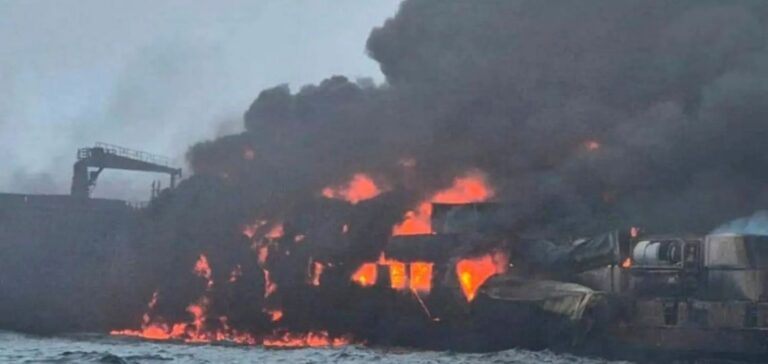A maritime collision occurred in the North Sea involving the oil tanker Stena Immaculate, operated by the American company Crowley, and the cargo ship Solong, owned by the German company Reederei Köpping. The accident took place off the Yorkshire coast, causing a fire and injuring 32 crew members, who were evacuated to the port of Grimsby in northeast England.
Sequence of the accident
The alert was issued shortly before 10:00 GMT by the British coastguard. According to initial reports, the Stena Immaculate, which was transporting petroleum products from Greece, was near the port of Immingham when it collided with the Solong. The impact triggered a fire, visible in images broadcast by local media, showing large plumes of smoke and flames.
Maritime authorities deployed a rescue helicopter, several lifeboats, and an aircraft to assist the crews and combat the fire. Nearby vessels equipped with firefighting systems were also dispatched to contain the situation.
Evacuation and medical response
The 32 injured crew members were transported to Grimsby by three rescue vessels. Ambulances were present at the dock to provide immediate medical care. According to the director of Grimsby port, the situation required a swift mobilisation of emergency services to treat the injured and organise the evacuation logistics.
The owners of the involved vessels confirmed that their crews were safe. However, an assessment of material damage and operational consequences is ongoing.
Environmental risks under scrutiny
British authorities are examining the potential maritime pollution risks linked to the accident. The nature of the cargo transported by the Stena Immaculate has raised concerns, particularly regarding a possible hydrocarbon spill into the North Sea. Pollution control experts have been deployed to monitor the situation and implement containment measures if necessary.
Investigation and safety measures
The Marine Accident Investigation Branch (MAIB) has launched an inquiry to determine the exact circumstances of the collision. The investigation will focus on navigation conditions, communication between the vessels, and potential technical or human failures.
The International Maritime Organization (IMO) has stated that an official report will be produced once analyses are complete. This incident reignites discussions about maritime traffic safety measures in the North Sea, a region where several collisions have been recorded in recent years.






















